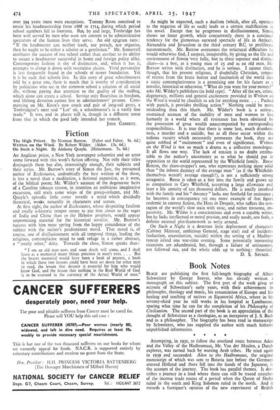Fiction
AN Anglican priest, a New York newspaper columnist and an actor come forward with this week's fiction offering. Not only their titles distinguish them but also, interestingly enough, their subjects and their styles. Mr. Barrow's story of Simon the Just, the presumed author of Ecclesiastes, undoubtedly the best written of the three, is less a novel than a meditation, a fictional expansion, as it were, of the biblical poem; Mr. Wilder's account of the degenerate heirs of a Carolina tobacco tycoon, in intention an ambitious imaginative excursion, still trails some wisps of the gossip-column, and Mr. Quayle's episodic little come reveals a mind which decidedly theatrical, works naturally in characters and scenes.
At first sight, the author of Ecclesiastes, whose despairing fatalism and totally a-historic temper seems to put him closer to the sages of India and China than to the Hebrew prophets, would appear unpromising material for the historical novelist. Mr. Barrow's success with him must spring from the happy coincidence of the subject with the author's predominant mood. That mood is, of course, one of disillusionment with-all temporal things, leading the religious, contemplative mind to seek refuge in a rather abstract, a " totally other," deity. Towards the close, Simon speaks thus: " I am an old man now, and soon death will come, and I shall leave- as a memorial many things precious in men's eyes. . . . But the braver memorial would have been a book of prayers, a book in which those two lessons could have been set down for other men to read, the lesson that despair is essential for him who would know God, and the lesson that nothing in the Real World of God is to be assessed in the currency of the Actual World of men."
As might be expected, such a dualism (which, after all, operates to the negation of life as such) leads to a certain stultification in the novel. Except that he progresses in disillusionment, Simon shows no inner growth, while concurrently there is a continual tendency for the glamorous outward spectacle of life in Antioch, Alexandria and Jerusalem in the third century B.C. to proliferate autonomously. Mr. Barrow overcomes the structural difficulties he would otherwise find, I suspect, insuperable, by giving us the life and environment of Simon 'very fully, but in three separate and distinct slices—as a boy, as a young man of 25 and as an old man. Mr. Barrow writes with distinction, and he is serious. I cannot think, though, that his present religious, if doubtfully Christian, temper of retreat from the brute horror and fascinatioh of the world into a static contemplativeness is a promising one for his future as a novelist, historical oc otherwise. " What do you want for your money?" asks Mr. Wilder's publishers (in bold type). "After all the sex, crime, degeneracy, millions and, general excitement provided in Written on the Wind it would be churlish to ask for anything more. . . . Packed with punch, it provides thrilling action." Nothing could be more misleading than this blurb. Mr. Wilder's book is a serious, restrained account of the inability of men and women to live humanly in a world where all resistance has been obviated by the possession of great wealth unaccompanied by corresponding responsibilities. It is true that there is some lust, much drunken- ness, a murder and -a suicide, but as all these occur within the tedious vacuity which necessarily' permeates the book, they are quite robbed of " excitement " and even of significance. Written on the Wind is not so much' a drama as a collective monologue. It all flows one way. The lack of tension is no dmibt attribu- table to the author's uncertainty as to what he should put in opposition to the world represented by the 'Whitfield family. Reese Benton, the share-cropper's son, who represents nothing more solid than the inborn decency of the average man" (as if the Whitfields themselves weren't average enough!), is not a sufficiently strong antagonist. Reese is taken as a boy into the family and grows up as companion- to Cary Whitfield, accepting a large allowance and later a life annuity of ten thousand dollars. He is totally involved with the family and his " decency " lacks any foothold for .resistance ; he becomes in consequence yet one more example of that figure endemic in current fiction, the Hero in Despair, who suffers the con- tagion of the world's slow stain with stoic, and rather tiresome, im- passivity. Mr. Wilder is a conscientious and even a capable writer, but he lacks intellectual or moral 'passion, and really needs, one feels, a definite external plot-framework to write around.
On Such a Night is -a dextrous little deployment of characters (Cabinet Minister, ambitious General, stage star) and of incidents (seduction, assassination, suicide) within the setting of a Mediter- ranean island one war-time evening. Some potentially interesting situations are adumbrated, but, through a failure of seriousness, not followed out, and the whole adds up to nothing : theatrical.
D. S. SAVAGE.


































 Previous page
Previous page